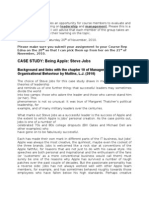Steve Jobs
Steve Jobs
Uploaded by
Patricia SusckindCopyright:
Available Formats
Steve Jobs
Steve Jobs
Uploaded by
Patricia SusckindOriginal Description:
Copyright
Available Formats
Share this document
Did you find this document useful?
Is this content inappropriate?
Copyright:
Available Formats
Steve Jobs
Steve Jobs
Uploaded by
Patricia SusckindCopyright:
Available Formats
Steve Jobs, the co-founder of Apple Inc.
, is undoubtedly a figure whose impact on the
technology and business world cannot be denied. However, a critical review of his legacy brings
to light several aspects that warrant careful consideration.
One of the most striking criticisms of Steve Jobs is his management style. While often hailed as
a visionary leader, his approach was marked by his often abrasive and autocratic behavior. He
was known to be a perfectionist who demanded nothing short of excellence from his
employees. While this may have led to the creation of groundbreaking products, it also
fostered a toxic work environment that bred fear and stifled creativity. Many former employees
have spoken out about the immense pressure they faced and the toll it took on their well-
being.
Additionally, Jobs' reluctance to acknowledge the contributions of others is a notable critique.
He was known for downplaying the efforts of his colleagues and taking credit for their ideas.
This not only undermined the collaborative nature of innovation but also hindered the growth
and morale of his team members. His inability to share credit appropriately stands as a
testament to his egocentric approach to leadership.
Furthermore, Jobs' approach to philanthropy has been criticized. Despite amassing immense
wealth through Apple's success, he was notorious for his lack of philanthropic initiatives. His
focus on creating revolutionary products was admirable, but his failure to give back to society
in a meaningful way raises questions about his priorities and social responsibility.
Another significant point of criticism is Jobs' obsession with aesthetics at the expense of
practicality. While Apple products are undoubtedly stylish and well-designed, they often
sacrificed user-friendliness and repairability. This led to a culture of planned obsolescence,
where products were intentionally designed to have a limited lifespan, contributing to
electronic waste and environmental concerns.
Moreover, Jobs' closed ecosystem approach is a point of contention. While it can be argued
that this approach led to a more streamlined and controlled user experience, it also limited
consumer choice and stifled competition. The stringent control over the App Store and the
limited compatibility between Apple devices locked users into a singular ecosystem, potentially
hindering innovation and limiting consumer freedom.
In conclusion, while Steve Jobs' contributions to the technology industry are undeniable, a
critical review of his legacy reveals a complex figure with both commendable and questionable
aspects. His leadership style, credit-taking tendencies, lack of philanthropy, design priorities,
and closed ecosystem approach all warrant careful consideration when evaluating his overall
impact. While he undoubtedly revolutionized the tech world, it is important to view his legacy
through a balanced and critical lens.
You might also like
- Ebook PDF Technology in Action Complete 14th Edition PDFDocument41 pagesEbook PDF Technology in Action Complete 14th Edition PDFluis.fowler18798% (48)
- Steve Jobs Leadership StyleDocument14 pagesSteve Jobs Leadership Styleadee_uson100% (2)
- Jobs Movie Reaction PaperDocument1 pageJobs Movie Reaction Paperliandra espinosa100% (2)
- CUEGIS Essay AppleDocument4 pagesCUEGIS Essay AppleAhan Korde0% (1)
- Apple Organizational AnalyzeDocument4 pagesApple Organizational AnalyzeThomas LiuNo ratings yet
- Apple Inc. - Case StudyDocument9 pagesApple Inc. - Case StudyDeepak Nagwanshi100% (1)
- Apple Design-1111Document5 pagesApple Design-1111Sharad KumarNo ratings yet
- Binhntkhs130031 MGT103 Individual AssignmentDocument4 pagesBinhntkhs130031 MGT103 Individual AssignmentBinh NgoNo ratings yet
- AU5800 Online Specification For Version 5.0 or LaterDocument61 pagesAU5800 Online Specification For Version 5.0 or LaterRubi Kauneus MørkeNo ratings yet
- Portfolio Activity Unit 8 MiGEDocument5 pagesPortfolio Activity Unit 8 MiGEamolek94No ratings yet
- The Visionary Legacy of Steve JobsDocument3 pagesThe Visionary Legacy of Steve Jobsb23fa1557No ratings yet
- Leadership Change at Apple and Its Implications On Organisational CultureDocument5 pagesLeadership Change at Apple and Its Implications On Organisational CultureblossomjanNo ratings yet
- Effective Leadership AssignmentDocument3 pagesEffective Leadership AssignmentjaganNo ratings yet
- Leadership PPT (Group 16) - 1-5Document5 pagesLeadership PPT (Group 16) - 1-5fhq54148No ratings yet
- UntitledDocument4 pagesUntitledLatifa EbrahimNo ratings yet
- OB AssignmentDocument12 pagesOB Assignmentwei ren limNo ratings yet
- Case Study Strategic Leadership of Steve Jobs at Apple Inc - Copie - CopieDocument8 pagesCase Study Strategic Leadership of Steve Jobs at Apple Inc - Copie - Copiekghilou22No ratings yet
- Harvard Business ReviewDocument2 pagesHarvard Business Reviewcorradopassera100% (1)
- CUEGIS Innovation and Culture Affect Decision-MakingDocument2 pagesCUEGIS Innovation and Culture Affect Decision-MakingKRISHA KALSINo ratings yet
- Case1 BA 540Document3 pagesCase1 BA 540prashanthzNo ratings yet
- Apple Inc. Organizational ChangeDocument7 pagesApple Inc. Organizational Changejavaid IqbalNo ratings yet
- Running Head: Leader That I Admire 1Document7 pagesRunning Head: Leader That I Admire 1me_royal09No ratings yet
- Strategic Leadership at AppleDocument16 pagesStrategic Leadership at AppleYMCA Trinidad and Tobago100% (1)
- Apple Company Leadership Change - Edited 1 .EditedDocument13 pagesApple Company Leadership Change - Edited 1 .EditedFun Toosh345No ratings yet
- Aple Case Save AsDocument18 pagesAple Case Save AsRafeek AhmmedNo ratings yet
- Case Study APPLE - NajwaahmadDocument9 pagesCase Study APPLE - NajwaahmadQamarul Iqmal100% (2)
- Case StudyDocument2 pagesCase StudyAditya JainNo ratings yet
- Strategic Leadership and Innovation Case StudyDocument5 pagesStrategic Leadership and Innovation Case StudyrosabjorkNo ratings yet
- People Management 111Document11 pagesPeople Management 111Saimah KaziNo ratings yet
- Steve Job's Leadership StyleDocument5 pagesSteve Job's Leadership StyleBharath Priya0% (1)
- Steve Jobs Movie Assignment IIDocument6 pagesSteve Jobs Movie Assignment IITaha Al-abedNo ratings yet
- Steve Jobs Literature ReviewDocument5 pagesSteve Jobs Literature Reviewafmzbzdvuzfhlh100% (1)
- Apple Case ReportDocument14 pagesApple Case ReportRishabhNo ratings yet
- Bulding A CompanyDocument11 pagesBulding A CompanyTariq A. BuhilaigahNo ratings yet
- Apple LeadershipDocument7 pagesApple LeadershipImwaniki21No ratings yet
- Steve Jobs Research Paper ThesisDocument8 pagesSteve Jobs Research Paper Thesisowynqovcf100% (1)
- Final ArtifactDocument6 pagesFinal Artifactapi-653798590No ratings yet
- Research Paper Steve JobsDocument6 pagesResearch Paper Steve Jobsljkwfwgkf100% (1)
- The Steve Jobs WayDocument5 pagesThe Steve Jobs WayTeju KiranNo ratings yet
- Steve Jobs Research Paper ThesisDocument4 pagesSteve Jobs Research Paper Thesisb0pitekezab2100% (1)
- Stevejobs The Transactional LeaderDocument35 pagesStevejobs The Transactional LeaderningegowdaNo ratings yet
- Apple Case AssignmentDocument6 pagesApple Case AssignmentJananiNo ratings yet
- Apple WriteupDocument3 pagesApple WriteupVishrut SharmaNo ratings yet
- Group Assignment-Case StudyDocument2 pagesGroup Assignment-Case Studygriffith2010No ratings yet
- ArtifactDocument8 pagesArtifactapi-640967891No ratings yet
- Steve Jobs EssayDocument6 pagesSteve Jobs EssayAbhilash100% (1)
- Case 1 AppleDocument6 pagesCase 1 AppleDeepak NagwanshiNo ratings yet
- Steve Jobs Leadership 2Document1 pageSteve Jobs Leadership 2mariam fathelbabNo ratings yet
- Apple Inc CultureDocument10 pagesApple Inc CultureFariha Tabassum ChoudhuryNo ratings yet
- Steve Jobs Case StudyDocument3 pagesSteve Jobs Case StudyMuhammad Hassan Alvi100% (1)
- A Critical Analysis of Internal and External Environment: Case Study of Apple IncDocument15 pagesA Critical Analysis of Internal and External Environment: Case Study of Apple IncAditya Jayrama RajanNo ratings yet
- Apple Company Leadership Change - Edited 1 .EditedDocument13 pagesApple Company Leadership Change - Edited 1 .EditedFun Toosh345No ratings yet
- Presentation OurDocument10 pagesPresentation Ourtrilokfartyal83No ratings yet
- Full NameDocument4 pagesFull Namekhin layNo ratings yet
- A Study On AppleDocument12 pagesA Study On Appleswift StyleNo ratings yet
- Current Issues Faced by ManagersDocument14 pagesCurrent Issues Faced by ManagersJasjot BindraNo ratings yet
- Manage Theory 2Document7 pagesManage Theory 2api-640981642No ratings yet
- Company CultureDocument1 pageCompany CultureThe GentlemanNo ratings yet
- Steve JobsDocument2 pagesSteve JobsSweta SharmaNo ratings yet
- Leadership Lessons from Visionaries: Insights from Business TitansFrom EverandLeadership Lessons from Visionaries: Insights from Business TitansNo ratings yet
- Saddam HusseinDocument2 pagesSaddam HusseinPatricia SusckindNo ratings yet
- Vietnam War RevisitedDocument3 pagesVietnam War RevisitedPatricia SusckindNo ratings yet
- Illuminating The UniverseDocument2 pagesIlluminating The UniversePatricia SusckindNo ratings yet
- Unveiling The CosmosDocument3 pagesUnveiling The CosmosPatricia SusckindNo ratings yet
- The Essential Nutrients For A Healthy LifestyleDocument3 pagesThe Essential Nutrients For A Healthy LifestylePatricia SusckindNo ratings yet
- BOOK Exploring NeuroscienceDocument24 pagesBOOK Exploring NeurosciencePatricia SusckindNo ratings yet
- BOOK Exploring Neuroscience-6Document1 pageBOOK Exploring Neuroscience-6Patricia SusckindNo ratings yet
- BOOK Exploring Neuroscience-5Document1 pageBOOK Exploring Neuroscience-5Patricia SusckindNo ratings yet
- Exploring Neuroscience 14-20Document7 pagesExploring Neuroscience 14-20Patricia Susckind100% (1)
- Slanetrac Brochure 2020 TS Plant Sales NE LimitedDocument16 pagesSlanetrac Brochure 2020 TS Plant Sales NE LimitedJhayr AmorimNo ratings yet
- Instructor Materials Chapter 1: Explore The Network: CCNA Routing and Switching Introduction To Networks v6.0Document24 pagesInstructor Materials Chapter 1: Explore The Network: CCNA Routing and Switching Introduction To Networks v6.0Bang MametNo ratings yet
- CUS11.Enquiry Display Options PDFDocument19 pagesCUS11.Enquiry Display Options PDFMrCHANTHANo ratings yet
- Juaneza - Kathlyn - Activity 1Document2 pagesJuaneza - Kathlyn - Activity 1juanezakathlyndNo ratings yet
- Events InformationDocument3 pagesEvents InformationMatheo BienaimeNo ratings yet
- 22 PLC15 Bset 1Document2 pages22 PLC15 Bset 1Himanshu ChouhanNo ratings yet
- Electrical Engineering Portal Com Electrical Thumb Rules You Must Follow Part 2Document8 pagesElectrical Engineering Portal Com Electrical Thumb Rules You Must Follow Part 2m khNo ratings yet
- Space4Youth Competition 2021 Call For Essays FinalDocument4 pagesSpace4Youth Competition 2021 Call For Essays FinalMohammad NaufalNo ratings yet
- Network Penetration and Testing in A Rural Banking Environment in GhanaDocument5 pagesNetwork Penetration and Testing in A Rural Banking Environment in GhanaInternational Journal of Innovative Science and Research TechnologyNo ratings yet
- Applications: LCV CAN Data Reading Antenna DetectionDocument3 pagesApplications: LCV CAN Data Reading Antenna DetectionNattagit jiteurtragoolNo ratings yet
- Practica de Ingles CursoDocument5 pagesPractica de Ingles CursoRicky GalanNo ratings yet
- Instructions For Use: Circuit BreakersDocument52 pagesInstructions For Use: Circuit BreakersIsrael JosueNo ratings yet
- Dbms RecordDocument94 pagesDbms RecordChris Sosa JacobNo ratings yet
- Sorry Wrong NumberDocument10 pagesSorry Wrong NumberlumiziellNo ratings yet
- Nouvelles Approches Simplifiées Pour L'Evaluation de La Performance Sismique Des Barrages en RemblaiDocument24 pagesNouvelles Approches Simplifiées Pour L'Evaluation de La Performance Sismique Des Barrages en RemblaiAf RymNo ratings yet
- Pay Slip PDFDocument3 pagesPay Slip PDFDominic ThiemNo ratings yet
- 02 PDFDocument8 pages02 PDFFitri YanuarNo ratings yet
- 988B Diagrama ElectricoDocument4 pages988B Diagrama ElectricoMaquinaria Pesada ServisNo ratings yet
- Module-2 - Lecture 2: Alu - Signed Addition/SubtractionDocument44 pagesModule-2 - Lecture 2: Alu - Signed Addition/SubtractionWINORLOSENo ratings yet
- Avanti Fellows - 29 - 03 - 2021 - 11 - 51 - 05Document3 pagesAvanti Fellows - 29 - 03 - 2021 - 11 - 51 - 05chiru charanNo ratings yet
- What Is A Tessellation 1Document17 pagesWhat Is A Tessellation 1jlcadmanNo ratings yet
- Reliability Theory and Survival Analysis FinalDocument12 pagesReliability Theory and Survival Analysis FinalAyushi jainNo ratings yet
- Wireless Integrated Network Sensors (WINS) : CH - Srujana 17VE1A04K2Document16 pagesWireless Integrated Network Sensors (WINS) : CH - Srujana 17VE1A04K2soujanya soujNo ratings yet
- ECE-6323 Deck 01x PDFDocument51 pagesECE-6323 Deck 01x PDFToua MouaNo ratings yet
- Module 1 - Rapid Recall QuestionsDocument3 pagesModule 1 - Rapid Recall QuestionsSatvir GillNo ratings yet
- Regedit 2Document8 pagesRegedit 2smokeZ12No ratings yet
- Akamai Web Application FirewallDocument10 pagesAkamai Web Application FirewallSushil SainiNo ratings yet
- ITI Examiner User Manual (Draft) V1-1Document22 pagesITI Examiner User Manual (Draft) V1-1Saheera HazarikaNo ratings yet


































































































